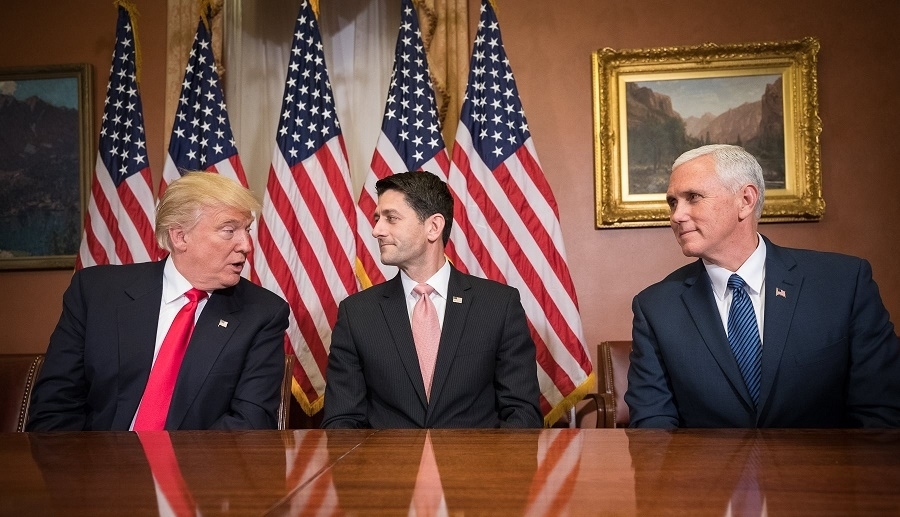National
House Republicans seek more tax cuts as elections near

WASHINGTON (AP) — House Republicans have launched an effort to expand the massive tax law they muscled through Congress last year, aiming to make permanent the individual tax cuts and small-business income deductions now set to expire in 2026.
The pre-midterm elections push, which clicked into gear Tuesday, is portrayed as championing the middle class and small businesses. Rep. Kevin Brady, R-Texas, who heads the tax-writing House Ways and Means Committee, said making the tax cuts permanent would build on the tax law’s economic boost by adding 1.5 million new jobs and increasing wages.
With the elections about four months away, polls are showing mixed support among voters for the $1.5 trillion package of individual and corporate tax cuts that President Donald Trump signed into law as his marquee legislative achievement.
The new tax proposals are aimed at giving Republican lawmakers a selling point as they prepare to leave Washington to campaign in their districts.
“It’s going to identify Republican priorities,” said Marc Gerson, a former majority tax counsel for the Ways and Means Committee, who now heads the Washington law firm Miller & Chevalier.
The new Republican outline also calls for new tax incentives for savings, by creating a “universal savings account” for families and allowing the popular, tax-free 529 college savings accounts to also be used to pay for apprenticeship fees and home schooling expenses, as well as paying off student debt. In addition, workers would be able to tap their retirement savings accounts without tax penalty to cover expenses from the birth of a child or an adoption.
Start-up businesses would be permitted to write off more of their initial costs.
“We plan to work off this framework to build on the growing successes of the (tax law) and ensure this energized economy continues moving forward,” Brady said in a statement.
The tax law that took effect Jan. 1, the most sweeping rewrite of the U.S. tax code in three decades, is estimated to add around $1.5 trillion to the ballooning deficit. And deficit hawks as well as Democratic lawmakers — who were unanimous in opposing the tax legislation last year — wondered Tuesday how the Republicans intended to pay for the extended tax cuts.
“It’s amazing to think that Washington’s record debt binge by Congress still isn’t over,” Maya MacGuineas, president of the Committee for a Responsible Federal Budget, said in a statement. “This country is drowning in red ink. It is beyond irresponsible to add even a dollar more to the debt, and anyone who cares about fiscal responsibility should dismiss further tax cuts outright.”
Sen. Ron Wyden of Oregon, the senior Democrat on the Senate Finance Committee, said the new Republican proposal “doubles down on massive breaks for the rich and sweeteners for high fliers while trying to cover up the broken middle-class promises from their first tax law.”
“Wages are falling as the cost of living climbs higher and higher,” Wyden said in a statement. “Instead of working across the aisle on ways to boost paychecks for working Americans, congressional Republicans laid out a plan to give the fortunate few another round of deficit-exploding tax cuts.”
The new tax law provides steep tax cuts for corporations and the wealthiest Americans, and more modest reductions for middle- and low-income individuals and families.
While the law slashed the corporate tax rate permanently from 35 percent to 21 percent, its tax cuts for individuals and the millions of U.S. “pass-through” businesses expire in eight years. The “pass-through” businesses pipeline their income to owners and other individuals, who then pay personal income tax on those earnings, not the corporate rate. They are allowed under the new law to deduct 20 percent of the first $315,000 of their earnings.
Also until 2026, the tax law ended the $4,050 personal exemption for individuals, and capped at $10,000 the amount of property taxes or state or local taxes that consumers can deduct on their federal returns.
Early this year, millions of working Americans got a boost from the tax law as they saw increases in their paychecks with less tax withheld by employers. But as Trump’s populist attacks against free trade have erupted into trade wars with China and U.S. allies, trade tensions have overshadowed the tax cuts in economically vulnerable areas of the country that depend on exports.
With retaliation coming against U.S.-made products such as blue jeans, motorcycles and whiskey, many of the hardest-hit states are those that were won by Trump in the 2016 election. Some in the business community have warned that the positive impact on the economy from the tax cuts could be eroded by harm inflicted by trade disputes.
The solid Republican majority in the House nearly ensures passage of the new proposals before the November elections. But prospects in the Senate are clouded by the slim GOP majority and less appetite for tax cuts, given that a smaller proportion of members are facing re-election this year. Numerous senators are also concerned about the potential for blowing up the deficit with new tax cuts — absent corresponding new revenue sources.
“They’ll see what comes out” of the House, Gerson said.







